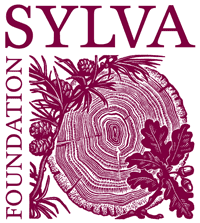In September we hosted our third annual summer school. This year we collaborated with the V&A museum and specifically the Make Good: Rethinking Material Futures to create ‘Field Notes’. The work of the 12 practitioners taking part in the summer school is now on display in the V&A’s Susan R Weber Furniture Gallery.
in May 2022 the V&A and Sylva Foundation launched an open call to invite creative practitioners with an interest in wood as a material, and forests and woodlands as a place for learning and growing, to apply. We were particularly interested in applications from disabled people and people from Black, Asian and minority ethnic backgrounds, and from people who identify as queer or female as these groups are currently under-represented in the fields of forestry, design and making in wood.
We received more than 100 applications. After a selection and interview process overseen by the V&A and Sylva Foundation, with external support from designer and educator Huren Marsh, 12 practitioners within art, design and architecture were selected. They are: Georgina Bowman, Beatrix Bray, Rachel Cox, Krupa C. Desai, George Fereday, Hannah-Lily Lanyon, Nia Manoylo, Phoebe Oldfield, Henrique J. Paris, Matthew Rosier, Alisa Ruzavina and Adam Stanford.
The Summer School was initiated with a week of inspirational online talks, seminars and mentoring sessions in August followed by a week in person at the Sylva Wood School in September. This week was a very special experience for everyone involved.
There were talks by curators, makers, conservators, foresters and arborists. There were forest walks, tree pruning sessions, milling of timber and hands-on making. All of these activities were underpinned by an open and ongoing discussion, with visiting experts and spending five days together. Each day started with the group assembling to share reflections from the previous day and ended with a communal dinner in Sylva Foundation’s Teaching Barn.
The brief for the summer school participants was to explore under-utilised, home-grown timber, and looking at issues of land use and ownership; management of forests; and questions of access and inclusion. As such each of the resulting projects was shaped by the practitioners’ own experiences.
All wood used during the summer school was sourced with the help of our partners, forestry charity, Grown in Britain. We provided a range of kiln-dried timbers, Alder, Ash, Douglas fir, Elm and Sweet Chestnut along with some freshly felled Ash and Birch from the Blenheim Estate. This offered the opportunity to explore the characteristics as well as the stories connected with them. We are very pleased that all of the timber used was certified as Grown in Britain guaranteeing its provenance.
The carefully curated display of the outcomes at the V&A act as a collection of ‘field notes’ that gather comments, questions and critical outputs regarding the future of forests and forestry. Rather than complete projects, they can be seen as prompts that invite further investigation and discussion. It looks amazing and we encourage you all to visit and let us know what you think – it will be on display until October 2023.
We would like to thank; Johanna Agerman-Ross, Maude Willaerts and Danilo Marques dos Reis from the V&A for driving the project forward and being great to work with. Dougal Driver and Rachel Lawrence from Grown in Britain for their ongoing support of our Summer Schools. All of the contributors during the two weeks, Huren Marsh, Dana Melchar, Sumitra Upham, Sharon Durdant-Hollamby, Mac Collins, Hattie Speed, Lynn Jones, Anthony Dain and Rae Sellen. Our Sylva Foundation team: Joe Bray, Phillip Gullam, Gabriel Hemery, Paul Orsi, and George Dennison. And finally, John Makepeace OBE for his support of the Make Good: Rethinking Material Futures and for sharing his knowledge and vast experience with us all over the two incredible weeks of learning.
“Without doubt this year’s Summer School has been the most amazing experience of my teaching career. Bringing together so many brilliant young people, from diverse backgrounds and creative fields then prompting them with inspiring talks, walks and access to our workshops and experienced teachers has led to twelve very special outcomes. Anyone interested in the future of our forests and the opportunities of using homegrown timber should definitely go and see the inspiring display.”
Make Good exhibition – a collaboration between the V&A and Sylva Foundation. Photo Gabriel Hemery











































